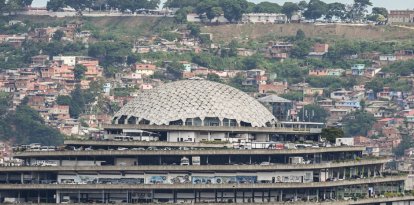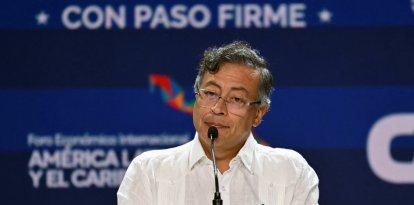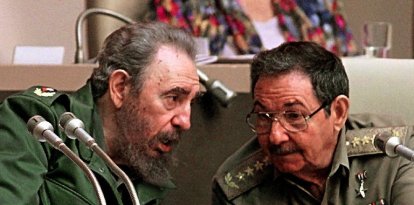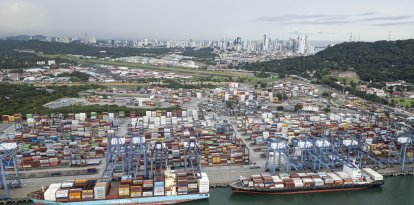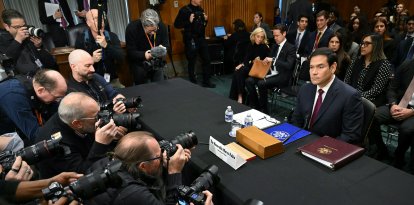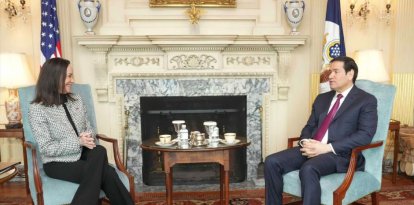U.S. and Colombia escalate diplomatic tension with call for consultations of their representatives
The resignation of the Colombian foreign minister further complicates the beginning of a de-escalation between the two countries.

Donald Trump and Gustavo Petro
The governments of the United States and Colombia on Thursday called for consultations of their maximum diplomatic representatives, in a new episode of tensions that further fractures the relationship between the two historically allied countries.
Washington struck the first blow with thecall for "urgent consultations" of the U.S. chargé d'affaires in Bogota, John McNamara, "following repudiatory and unfounded statements by the highest officials of the Colombian government," in the words of State Department spokeswoman Tammy Bruce.
In response, Colombian President Gustavo Petro summoned his ambassador to the United States, Daniel García-Peña, on his side. The bilateral relationship is in its lowest hours. In recent months, the leftist president and his U.S. counterpart, Donald Trump, clashed over issues such as the deportation of migrants and the tariff war.
The weekend added the revelation of an alleged plot to overthrow Petro with the help of Colombian and U.S. politicians. Spanish newspaper El País published audios suggesting a coup plot led by Petro's former foreign minister, Álvaro Leyva, in a case being investigated by the prosecutor's office.
Petro had denounced in June a supposed coup attempt organized by the Colombian and U.S. "extreme right". Then, he claimed that a "leader", whom he did not identify, had spoken with U.S. Secretary of State, Marco Rubio.
The president ruled out during a speech Thursday in Bogota that Rubio "is in a coup d'état" against his government. "I don't believe that a government that has Iran as an enemy and some nuclear bombs pointed at (...) is going to start fooling around with a coup d'état" in Colombia, he added.
The resignation of the Colombian foreign minister further complicates a de-escalation process
Although for different reasons, the Colombian foreign minister, Laura Sarabia, announced her resignation Thursday morning citing "differences" with Petro. The resignation of the most powerful woman in Colombia's first leftist government is not directly related to the storm with the United States, but the vacancy of the foreign ministry further hinders possible rapprochements that would moderate the strained relationship between the two countries.
Sarabia distanced himself from the president due to disagreements on several issues, the last one being the extension of the contract with the company that manufactures and distributes Colombian passports.
In a letter to the president, the minister assured thatshe does not share "decisions" that have been taken "in the last days" and that prevent her from "accompanying" the leftist project. Petro's government suffers a cabinet crisis through which more than 50 ministers have passed, for 19 portfolios, in three years.
Sarabia, a key figure for Petro
Sarabia, 31 years old and without a previous political career, was akey figure in Petro's 2022 presidential campaign. After her victory, she becamechief of staff, then held two top government posts and in January was named chancellor,the youngestin Colombia's modern history.
"She was vital in the campaign for her order and discipline," Petro said on social network X after the resignation, calling her "little organizing ant". Sarabia was seeking Washington's renewal of Colombia's certification as an anti-drug ally. The decision will be known in the coming months, at a time when the country is breaking world records for cocaine production.
In addition to calling McNamara for consultations, the United States will take other measures "to make clear" its "deep concern about the current state of the bilateral relationship," said the State Department spokeswoman. Bruce did not elaborate on what actions Washington will take, but stressed that Colombia remains "an essential strategic partner."
"Petro can't keep threatening the United States and think he can get away with it"
On Thursday, 30 Colombian lawmakers asked in a letter to the U.S. Congress to investigate Republican congressmen Mario Diaz-Balart, Maria Elvira Salazar and Carlos Gimenez for "interfering actions," allegedly by having "held meetings" with Leyva.
"Petro can't keep threatening the United States and then think he can get away with it," Gimenez wrote Thursday on X, calling the president a "narcoterrorist socialist."
Petro responds to Rep. Gimenez: "I do not kneel or let myself be pressured"
"Pick the enemy, we are not," Petro responded Thursday. "I do not kneel nor do I let myself be pressured, nor am I scared by a congressman calling me a narco-terrorist."
Colombia's entry into China's megaproject New Silk Roads and its search for new trade partners also irritate the United States. In addition, the Colombian government refused to extradite to the United States two guerrillas wanted for drug trafficking offenses.
Petro disagrees with Washington on the focus of the anti-drug fight, which he considers a "failure". A little more than a year away from leaving power, the leftist is betting onattacking consumption in the major powers and negotiating peace with the armed groups.













